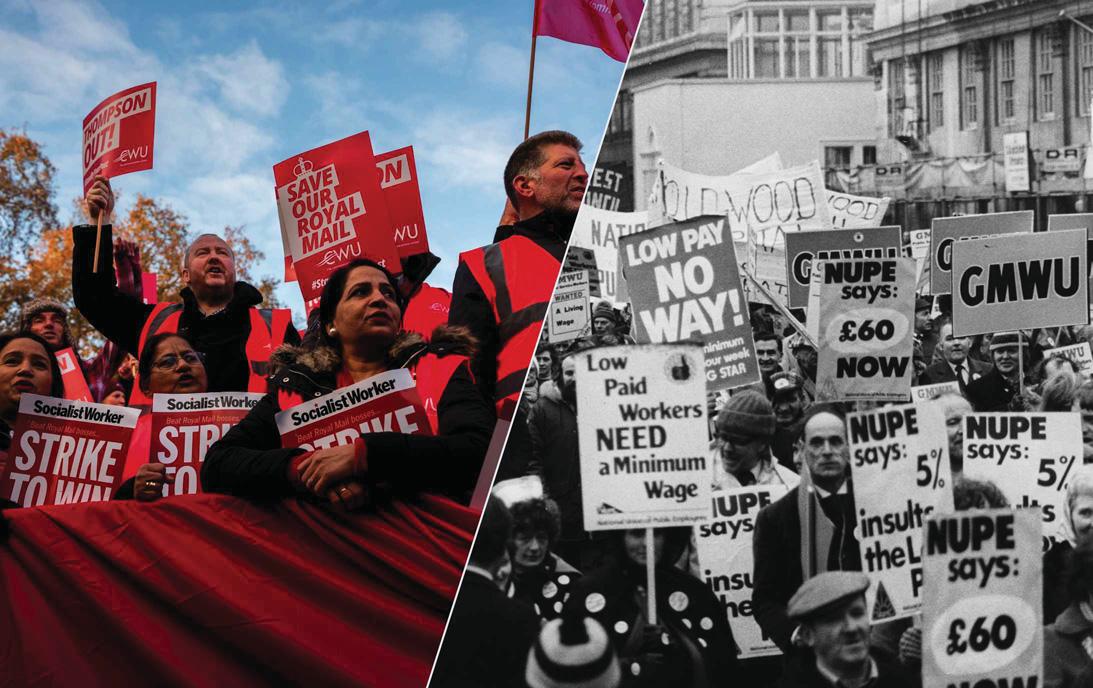Prøve GULL - Gratis
Britain's century of strike action
BBC History UK
|February 2023
Recent months have seen thousands of workers - including nurses, railway employees and postal staff go on strike around the United Kingdom. RICHARD TOYE explores the nation's history of industrial action, and the extent to which it has been driven by political ideology or practical concerns


Radical action? Members of the National Union of Seamen at a rally in Liverpool calling for shorter hours and higher wages, May 1966. Prime minister Harold Wilson's bid to link the strike to communism sparked ridicule
The widespread disruption caused by the recent series of strikes in the UK-in which even driving test examiners have laid down their iPads has led to comparisons with the 1978-79 Winter of Discontent, when large-scale action across a range of industries contributed to the fall of the Labour government led by James Callaghan. The current prime minister, Rishi Sunak, was not yet born in 1979, and memories of its events are now fading. Nevertheless, they retain a powerful hold on the political imagination, and have eclipsed other periods of disruption which were of equivalent historical significance.
With important exceptions, the British trades union movement has focused on improving pay and conditions rather than on overtly political objectives. By the turn of the 20th century, after decades of struggle, the union movement had become well established, with more than 2 million members - including many unskilled and semi-skilled workers. Moreover, the Labour Representation Committee was founded in 1900 with the purpose of providing "a distinct Labour group in parliament" in order to promote "legislation in the direct interests of labour". After a slow start, 29 Labour MPs were elected at the general election of 1906. They helped secure a Trades Disputes Act, restoring union rights that had been removed by the courts. Here was evidence that legal change could be achieved incrementally in the House of Commons; on the ground, unions could concentrate on bettering the positions of their own members via collective bargaining.
Denne historien er fra February 2023-utgaven av BBC History UK.
Abonner på Magzter GOLD for å få tilgang til tusenvis av kuraterte premiumhistorier og over 9000 magasiner og aviser.
Allerede abonnent? Logg på
FLERE HISTORIER FRA BBC History UK

BBC History UK
On the skids
Richard Rodgers and Oscar Hammerstein II's smash musical Oklahoma! opened on Broadway on 31 March 1943.
1 min
Christmas 2025

BBC History UK
Small pleasures
Memory is imperfect, but what if you could get a professional model maker to recreate a moment from the past?
1 min
Christmas 2025

BBC History UK
Bath in five places
In the Georgian era, Bath became arguably Britain's most fashionable destination. KIRSTEN ELLIOTT promenades five historic highlights
3 mins
Christmas 2025

BBC History UK
End times
Why do civilisations that dominated their epoch fail? In an era of autocracy, climate change, the rise of Al and a first-hand understanding of how deadly pandemics can be, it's a question that seems pertinent.
1 min
Christmas 2025

BBC History UK
What are the origins of the Yule Lads?
To learn about the Jólasveinar (Yule Lads), we must start with their mother, the terrifying ogress Grýla. Her name appeared in Icelandic texts as early as the 13th century, although it wasn’t until later that those 13 mischievous lads became associated with her. Folk tales and poems tell how she descends from the mountains with an empty sack to stuff full of children. Grýla owns the monstrous Jólaköttur (Yule Cat), which roams the countryside on Christmas Eve, searching for children to gobble up if they're not wearing new clothes.
1 mins
Christmas 2025

BBC History UK
Santa Claus v Father Christmas
The true identity of the white-bearded, red-robed figure who fills children's stockings at Christmas has long been debated. Thomas Ruys Smith sizes up the merry contenders
8 mins
Christmas 2025

BBC History UK
Frontier friction
Set in Washington Territory in 1854, The Abandons is a Western that's unusual for having two matriarchs, women whose lives become entangled, at its centre.
1 min
Christmas 2025

BBC History UK
The Last Days of Pompeii: The Immersive Experience
Delve into the culture of daily Roman life, witness the momentous eruption of Mount Vesuvius, and follow its fallout in Immerse LDN's new exhibition. In a blend of cutting-edge technology and vivid storytelling, this exhibition launches visitors into Pompeii's rich history with recreations of the ancient city's beautiful pre-eruption landscape, a 360-degree virtual reality Roman amphitheatre experience, and a digital metaverse recreating Pompeii's 'Villa of Mysteries'.
1 min
Christmas 2025

BBC History UK
Elizabeth Marsh The corsair's captive
Taken hostage by a Barbary ship's captain in the 18th century, a young Englishwoman found herself fighting for her freedom in Marrakech. ADAM NICHOLS introduces a brave captive who later wrote a book about her dramatic experiences
6 mins
Christmas 2025

BBC History UK
29 DECEMBER 1170: Thomas Becket is murdered in Canterbury
Knights loyal to Henry II rid him of the “low-born cleric”
2 mins
Christmas 2025
Translate
Change font size
